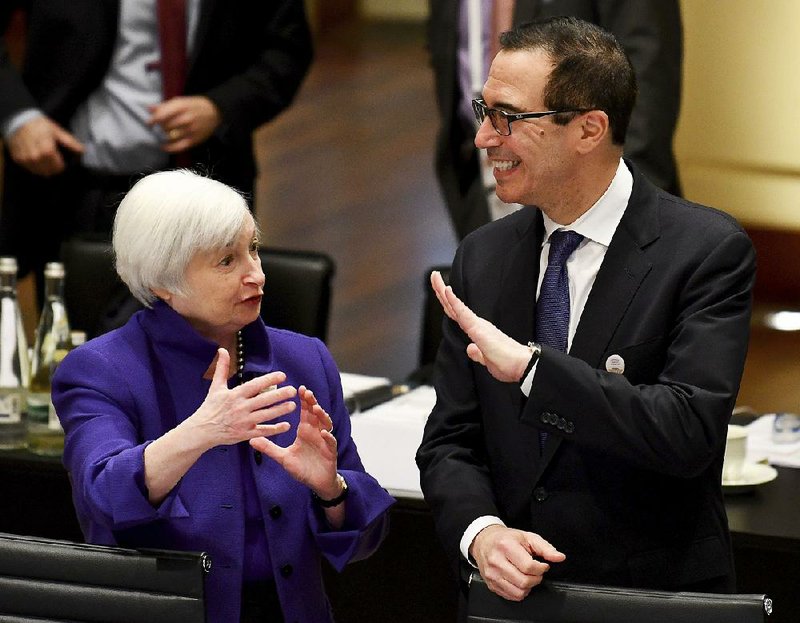BADEN-BADEN, Germany -- Top finance officials including new U.S. Treasury Secretary Steven Mnuchin debated Friday on how strong a statement to make in support of free trade at a meeting that will help set the tone for the global economy.
The gathering of finance ministers and central bank chiefs from the Group of 20 countries has focused on shifting attitudes toward trade, particularly after U.S. President Donald Trump vowed to impose border taxes and rewrite free-trade deals.
Attention has centered on a joint statement -- a kind of mission statement for the global economy -- that is being prepared for release today. Early drafts have dropped an earlier ban on protectionism, but there was no agreement on what to replace it with or exactly how to put their position into words, said officials who briefed reporters Friday on condition of anonymity because the talks were ongoing.
Deputies assigned to work out the details ahead of time had to leave the matter for the ministers, who held the first of their sessions late Friday afternoon German time at the two-day meeting in the town of Baden-Baden in southern Germany.
The meeting's host, German Finance Minister Wolfgang Schaeuble, told reporters that "no one has mentioned protectionism" and that the statement was about "the right formulation regarding the openness of the world economy."
Angel Gurria, secretary-general of the Organization for Economic Cooperation and Development, downplayed differences over the language.
He said it was "important to create a comfort zone" where leaders could have their first discussions with the new administration, "to make them feel that this is a place where we can talk, we can ventilate the areas where we have common ground and the areas where we may have differences." The organization is one of several international groups invited to participate in the meeting.
The last such gathering, in July in Chengdu, China, issued a strong statement in favor of free trade, saying "we will resist all forms of protectionism." That point was absent in early drafts put together in recent weeks ahead of this meeting; possible replacements include support for "fairness" and "inclusiveness."
China's focus on the status quo reflects the nation's economic success under the rules-based system since it joined the World Trade Organization in 2001. U.S. administration officials have criticized that setup, with the director of the National Trade Council, Peter Navarro, saying China's accession was to blame for much of a 15-year economic slowdown in the U.S. They want the G-20 to pledge that trade will be fair and equitable.
Mnuchin and Chinese Finance Minister Xiao Jie and central bank Gov. Zhou Xiaochuan are scheduled to hold a bilateral meeting in Baden-Baden, one of the G-20 officials said.
European countries and others that depend on exports, such as China, were said to be pushing for a stronger statement in favor of trade with fewer tariffs and other barriers in a rule-based system.
"We at the G-20, the rest of the world, aren't in favor of protectionism, in fact are for anti-protectionism," French Finance Minister Michel Sapin told reporters Friday. "We are for free, regulated international trade, with rules respected by everyone."
The G-20 is an informal forum on economic cooperation made up of 19 countries with more than 80 percent of the world economy, plus the European Union. The finance ministers' meeting will pave the way for a July 7-8 summit of national leaders in Hamburg, Germany.
Trump has repeatedly emphasized that the U.S. needs a tougher approach to trade that would put American workers and companies first. He has already pulled the U.S. out of the proposed Trans-Pacific Partnership agreement with Japan and other Pacific Rim countries and has started the process to renegotiate the North American Free Trade Agreement with Mexico and Canada, both of whom are G-20 members.
In a visit to Berlin ahead of the G-20 meeting, Mnuchin said the U.S. is interested in trade that is not only free but fair.
"Our objective is getting more balanced trade agreements," he said, confirming that having border taxes is an option. He said, without providing specifics, that some U.S. trade agreements need to be re-examined, while adding that, "It is not our desire to get into trade wars."
The G-20 meeting occurs as the global economy is in relatively good shape: the International Monetary Fund predicts growth of 3.4 percent this year and 3.6 percent next year, compared with 3.1 percent last year.
Yet the United Kingdom's vote last year to leave the European Union and its free trade zone and Trump's victory on an "America First" platform have underlined discontent with trade and globalization and a sense among many that the benefits of a globalized economy -- that is, with fewer barriers to trade and business -- do not reach enough people.
Advocates for free trade such as the IMF say trade restrictions will only hurt growth and won't benefit ordinary people, while urging measures to spread the benefits of trade more widely. That could include job training and education, since the IMF says trade and globalization have benefited higher-skilled workers.
Information for this article was contributed by David McHugh of The Associated Press and Birgit Jennen, Svenja O'Donnell and Jeff Black of Bloomberg News.
A Section on 03/18/2017
